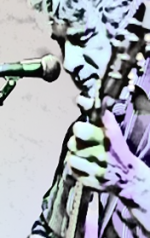![]() I’m a member of the faculty at Rose-Hulman Institute of Technology, a small (about 2,000 students), private college in Terre Haute, Indiana, granting degrees in math, science, and (mostly) engineering. Our focus is undergraduate education; teaching is our passion. We like to say that at Rose, everyone—faculty, staff, technicians, groundskeepers, housekeepers, everyone—is a teacher.
I’m a member of the faculty at Rose-Hulman Institute of Technology, a small (about 2,000 students), private college in Terre Haute, Indiana, granting degrees in math, science, and (mostly) engineering. Our focus is undergraduate education; teaching is our passion. We like to say that at Rose, everyone—faculty, staff, technicians, groundskeepers, housekeepers, everyone—is a teacher.
We open every school year with a one-day symposium for all staff and faculty—a time to greet new colleagues and fuel our enthusiasm for the coming year. One of our traditions is that faculty just promoted to the rank of full professor give 30 minute talks on topics of their choosing.
This year I gave my full-professor talk, “Elephants in the Room.”
It will come as no surprise to my friends and family that I took my guitar and gave my talk mostly in song. I spoke brief vignettes from a student’s point of view about how specific aspects of our campus culture—things we never talk about—can make some students feel they are outsiders, that maybe they don’t belong. I followed each vignette with a song matched to the story.
My final story tackled the idea, held by a nontrivial fraction of engineering faculty and others nationally, that the arts, humanities, and social sciences are impractical, unnecessary, and a poor investment (see recent headlines from Florida or Wisconsin, for example). I concluded along these lines…If, during this talk, you have been moved to anger, or laughter, or tears, you have experienced the power of the arts, and of the humanities and social sciences as well—a power of thought, argument, context, persuasion, and empathy—a power we need to put into our students’ hands. Without it, our graduates are even more likely to end up as corporate drones serving only the bottom line of corporate profits instead of the informed, technically-savvy citizens of the planet we desperately need.
To illustrate one final time the power and joy in the arts, I closed by singing a fairly new tune by David Roth, This is What We Call a Marriage Now. I heard him sing it at the Swannanoa Gathering this year and just had to cover it. (Thanks, David!)
The audiences’ response was wonderful. One colleague wrote me,
I was very moved by your full-professor talk today and I haven’t fully processed all of that experience. But I can say that I was so proud to see someone state in plain and human terms that “it’s all just marriage now” … . I have tucked it all away as inspiration for the future. So bravo, and cheers!
In “plain and human terms,” David’s song is a treasure. As far as I know, David has not yet released a recording, so keep a look out.

Leave a Reply